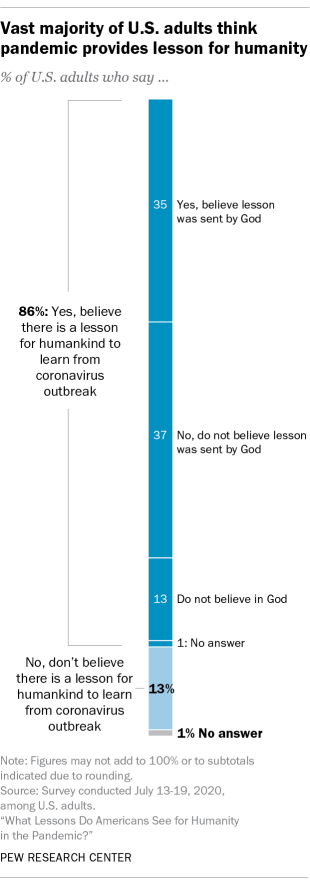As people reckon with the global upheaval that the coronavirus pandemic has caused, the vast majority of the United States believes that there is a lesson to be learned from everything the virus has wrought this year.
A survey from the Pew Research Center found that a resounding 86% of respondents “believe there is a lesson or set of lessons for humankind to learn from the coronavirus outbreak.”
Slightly more than one-third, 35%, of all respondents took that statement a step further and said that the coronavirus was a lesson sent by God. Only 13% of respondents said that there was no lesson to be learned from the coronavirus.

The survey was conducted with participants from Pew’s American Trends Panel, a sample of randomly selected adults in the U.S. that currently comprises 15,372 active respondents. That sample is weighted for such population benchmarks as gender, age, and education. More than 10,000 adults were polled for this survey, which was run from July 13-19, and 3,700 respondents were then asked to provide qualitative responses.
Pew did not quantify the specific lessons respondents thought the coronavirus was meant to teach, but it did provide samples of qualitative responses. Those ranged from “practical lessons, such as wearing a mask; personal lessons, like remembering the importance of spending time with family and loved ones; and societal lessons, such as the need for universal health care.”
There was a group of respondents who connected the coronavirus to the End Times. One woman called the pandemic “a biblical prophecy playing out.” Another individual said the coronavirus was a call from God “to change our ways. … God did not create mankind to live as we do. And he is not going to let this virus end until he knows that we have learned our lesson.”
Lesson-seeking respondents who either identified as nonreligious (13%) or said they were religious but didn’t believe the coronavirus was sent by God (37%) pointed to what they saw as structural problems that the pandemic exacerbated.
Those lessons focused on critiques of capitalism leading to “an unsustainable and inhumane system.” Others thought the pandemic belied “how horribly we are treating our Earth.”
Regardless of religious identification, political affiliation, or age, the vast majority of responses alluded to the idea of reevaluating many of the public’s day-to-day choices — a renewed emphasis on the “extreme importance” of cleanliness, voting for “best interest and not on party lines,” and valuing “humankind and intimacy.”
